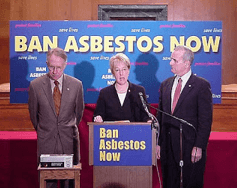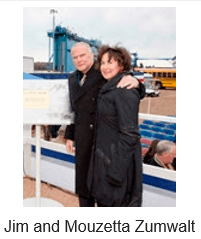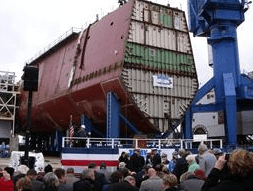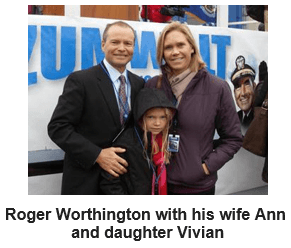Honoring Admiral Elmo Zumwalt and Remembering the Service Connected Asbestos-Induced Mesothelioma That Killed Him
Mesothelioma, as we know, does not respect fame, fortune, fitness, beauty or power. It has taken down movie stars ( Steve McQueen), athletes ( Merlin Olsen), artists ( Warren Zevon), politicians ( Bruce Vento), and warriors, such as Admiral Elmo Zumwalt.
Back in the late 1990s, when I helped launch the first-ever meso medical research foundation ( MARF ), Congressman Bruce Vento had just been diagnosed. Although his plate was full, and understandably he was reluctant to let the asbestos cancer shape his legacy, he agreed to serve on MARF’s board of directors. Vento was exposed to asbestos while working construction jobs earlier in his career.
About the same time, Admiral Zumwalt, who served as the Chief Naval Officer from 1970 to 1974, was also diagnosed, and soon after he passed away. Admiral Zumwalt was exposed to asbestos while serving his country on Navy ships. His mesothelioma was truly a “war-related disease.”

I was privileged to meet Congressman Vento, but I never met Admiral Zumwalt. We reached out to the Admiral’s children at the time his condition was made public to ask whether they would be interested in by serving on MARF’s Board. Mouzetta Zumwalt-Weathers agreed.
Branding Meso as a War-Related Disease
In the early days, Mouzetta helped MARF shape it’s research and advocacy agenda. This included the effort to re-define mesothelioma as a “ service connected disability” for thousands of asbestos-exposed US Navy Veterans. We hoped the “rebranding” would help persuade Congress and the DOD, in particular, to establish an asbestos cancer research program, much in the same way as it did for Agent Orange injured veterans.
In the early 2000s, there was also an effort in Washington, D.C., led by Senator Patty Murray, to ban asbestos. It was during this mission that I had the honor of meeting retired Lt. Colonel Jim Zumwalt (USMC). Jim gave a passionate speechon the day the bill to ban asbestos was announced, a speech laced with history, poetry, and the call to duty.
Jim Zumwalt became my hero of sorts. Like his father, who was not afraid to shake things up in the pursuit of progress, Jim expressed indignant disbelief that despite knowing about asbestos diseases since the early 1900s, and despite the thousands of warriors and civilians whose lives were cut short by asbestos, the US Government had yet to ban the evil carcinogen.
I'd Share A Fox Hole with this Guy

So a few months ago, when Jim invited me to join his family in the “laying of the keel” ceremony for a new class of destroyers named after his father, I lept at the opportunity. I’m certainly not a student of naval warfare. I don't invest in companies who profit handsomely from the military industrial complex. I don’t hob knob with politicians. And Bath, Maine was 3000 miles from home. But both Jim and Mouzetta had volunteered their time and energy to help causes that were near and dear to me, so I felt like it was the least that I could do.
Meso: In Search of a Poster Boy

Did I want, in some selfish way, for my hero Jim Zumwalt to mention how his father died? I’m not sure. General Dynamics printed up a very classy glossy brochure about the Admiral Zumwalt. Inside were headshot pictures of the three surviving Zumwalt children and the deceased fourth and oldest son, Elmo Zumwalt III. Beneath the latter’s photo, the caption read: “A Navy Lieutenant and Vietnam veteran, Elmo died in 1988 as a result of Agent Orange induced cancer.”
There it was, in frank language, the connection between the war, the combatant and the product that took his life. The brochure told us what killed the son, a carcinogenic herbicide used by our forces to defoliate the jungles of Vietnam. But it didn't mention what killed the father and namesake of the new line of sophisticated destroyers -- asbestos products.
Toxic Words?
Jim delivered a fine speech, telling us that in 2000 when President Clinton decided to name a new line of destroyers after Admiral Zumwalt, the decision was met with stiff resistance. But for the valiant advocacy of a few stalwart officers, according to Jim, it never would’ve happened. Mavericks tend to make enemies.
Mouzetta first thanked the thousands of Bath Iron Works shipyard workers who have been diligently building the revolutionary ship. She then read a letter from President Bill Clinton, who praised the Admiral for championing the civil liberties of all sailors, regardless of their sex, race or creed.
And Ann Zumwalt stepped up to the podium and playfully announced that Daddy always loved her best, adding a welcomed dose of warmth and humor to the solemn affair on such a frigid day. She said hello to her Mom and Dad up above, who “had the best seats in the house.” And, with a dramatic flair, she fittingly put her Dad in a long line of intrepid sailors going back to Odysseus: strong leaders who identified with the hardscrabble, bloody knuckled sea dogs. He was, she said, a "sailor's sailor."

Neither the children, nor any of three other dignitaries who spoke at the ceremony mentioned asbestos or mesothelioma. I searched the internet the next day and of the 20 or more articles that covered the “laying of the keel” ceremony, not one mentioned what killed Admiral Zumwalt.
Getting it Right
Does this upset me? I’d like to say it doesn’t, as my family and I were honored to be able to witness an important milestone in our nation’s naval history. I met Jim after the ceremony and sincerely congratulated him and his sisters for their moving tribute. I didn't dwell on the "elephant in the room" omission – it was their story, and their ship, and their father, and their moment, not mine.

Ten years ago I went to Washington DC for a tribute to Congressman Vento, who at the time was being treated for mesothelioma. President Clinton spoke, as did one of the greatest raconteurs of our time, Garrison Keillor. Nobody uttered the word “asbestos” or “mesothelioma,” like the words themselves were toxic.
A few years later Keillor wrote a book and in the book he mentioned meeting Congressman Vento who, he wrote, at the time was being treated for “lung cancer.” Mesothelioma is not lung cancer. I wasn't trying to be picky or pedantic. It wasn’t an “inside baseball” or “gotcha” thing but I felt compelled to write to Keillor. I explained to him that it was “mesothelioma” not “lung cancer” which had stricken the Congressman. The distinction was important, I wrote, because mesothelioma was an orphan, “industrial” disease that nobody wanted to talk about, let alone try to treat or cure.
Garrison Keillor wrote me back, which I thought was honorable in itself. He wrote words to the effect that he lamented his error, and that from what he knew of the man, Bruce would’ve wanted him “to get it right."
What Would the Admiral Want?
The Zumwalts have given much to our country. The admiral and his oldest son were both casualties of war-related injuries. Both Jim and Mouzetta have donated their valuable time and energy in the campaign to ban asbestos and fund meso research. I can see why on a chilly day in the short amount of time allotted they chose not to mention what took their Dad’s life. It's a special honor to have a new class of ships named after your Dad.
And yet, I guess I’m disappointed that nobody, at any time, in any medium, including the media who photographed, filmed and covered the event, attempted to “get it right. “
The history books will remember Admiral Zumwalt as a "sailor's sailor" who dragged the Navy "kicking and screaming" into the 20th Century. My guess, and this is only a guess, as I never met the man, is that the Admiral would’ve been pleased to allocate a slice of that $10 billion budget to fund a federal program to help treat his fellow sailors who were put in harms way by asbestos. He would've wanted to be remembered for making things right. Crusading for mesothelioma research is an exhausting and thankless mission. I’ll end this account by noting that over a decade since mesothelioma took the lives of great Americans like Congressman Vento and Admiral Zumwalt, we still don’t have a bona fide federally funded asbestos cancer research and treatment program. And, unforgivably, asbestos has not been banned. Progress is slow going. Hope can hold out only so long against the corrosive rust of frustration.
Congress has budgeted around $10 billion for the three Zumwalt destroyers. $10 billion with a "B." Thanks in large part to the advocacy of Admiral Zumwalt, whose own son was dying from cancer caused by chemical exposures, the DOD created a program to help Vietnam Vets suffering from Agent Orange induced cancers.



